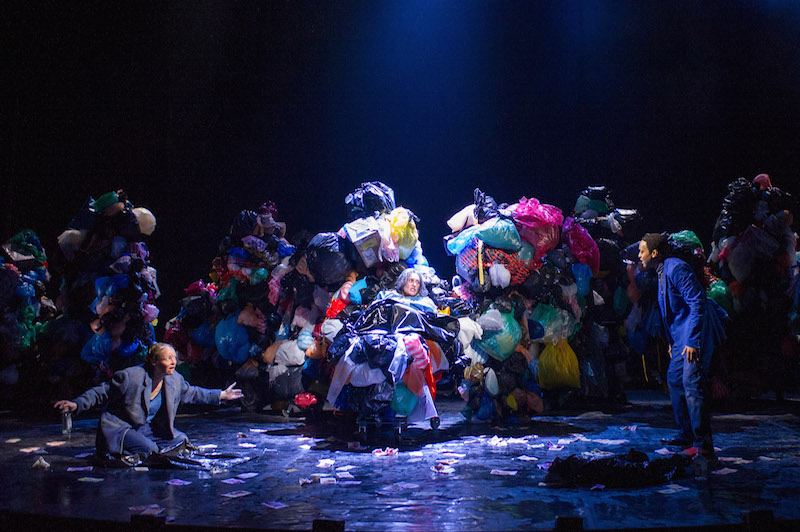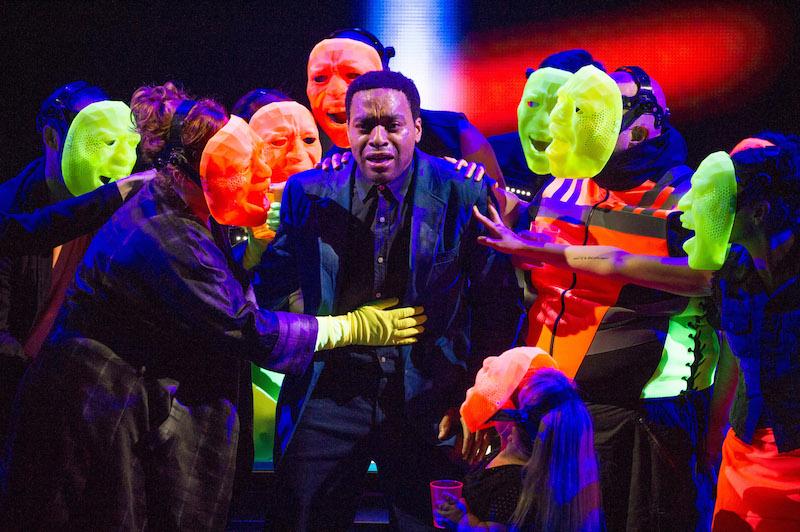As we stagger towards electoral chaos, isn’t it comforting to think there might be a master plan at work? That Russell Brand’s meddling is preordained, or Cameron’s "brain fade" an act of divine intervention? The second play in Rufus Norris’s inaugural season – and first with the new boss in the director’s chair – constructs a self-consciously colloquial, contemporary framework for 15th-century morality tale Everyman, but no amount of synchronised coke-snorting, public urination, expletives or shiny mannequins disguises the fact that this universe’s unquestionable, safely ordered Christianity renders it alien.
Chiwetel Ejiofor’s Everyman is an allegorical representation of mankind, and we are being called to account. God (Kate Duchêne, pictured below with Ejiofor), fed up with our greed, egotism and ingratitude, demands a reckoning of Everyman’s time on Earth. Faced with implacable Death (Dermot Crowley) during his hedonistic 40th birthday party, the non-believer scrabbles for leverage, offering money, seeking escape routes, and finally journeying through his own life in search of salvation.
 Norris and his collaborators, adaptor Carol Ann Duffy and choreographer Javier De Frutos, present a dynamic, darkly witty brand of heightened naturalism. Airy concepts are grounded, and the mundane gains significance. Yet core themes like erosion of personal responsibility are delivered in blunt, simplistic – albeit stylish – homilies; metaphor and ambiguity have no place here. That leaves meaning stranded in the cerebral, rather than viscerally delivered, and renders this 100-minute drama a relatively passive viewing experience.
Norris and his collaborators, adaptor Carol Ann Duffy and choreographer Javier De Frutos, present a dynamic, darkly witty brand of heightened naturalism. Airy concepts are grounded, and the mundane gains significance. Yet core themes like erosion of personal responsibility are delivered in blunt, simplistic – albeit stylish – homilies; metaphor and ambiguity have no place here. That leaves meaning stranded in the cerebral, rather than viscerally delivered, and renders this 100-minute drama a relatively passive viewing experience.
Everyman is at least a clear signal of intent from Norris: an overt state-of-the-nation play for our National Theatre. Poet Laureate Duffy shares that sense of responsibility, attacking “conspicuous consumption” when Everyman measures his worth in department store loyalty cards, the sham altruism of token Red Nose Day donations, and – particularly prominent – our “ruin of the Earth”. Solemn didacticism and occasionally cumbersome rhyming verse further stultify these soft targets. More compelling is Everyman’s emotionally hollow interactions with his estranged family, and the stirring exhortation to make our short lives count.
 Magnetic Ejiofor provides a much-needed focus for the episodic structure. His sonorous delivery of Duffy’s lyrical passages is exquisite, offset by powerful physicality. Crowley’s wry Death impresses, as does Duchêne’s compassionate God and defeated Good Deeds (pictured left with Ejiofor and Penny Layden). Sharon D Clarke is in fine voice, Layden’s an impish guide, and the chorus slickly deliver speech, song and pulsating movement. Williams Lyons’ score effectively juxtaposes Donna Summer with liturgical laments, while Ian MacNeil’s design and Tal Rosner’s projections offer arresting images; most memorable is Everyman plunging from a City high-rise, reminiscent of another troubled consumerist about to meet his (televisual) maker.
Magnetic Ejiofor provides a much-needed focus for the episodic structure. His sonorous delivery of Duffy’s lyrical passages is exquisite, offset by powerful physicality. Crowley’s wry Death impresses, as does Duchêne’s compassionate God and defeated Good Deeds (pictured left with Ejiofor and Penny Layden). Sharon D Clarke is in fine voice, Layden’s an impish guide, and the chorus slickly deliver speech, song and pulsating movement. Williams Lyons’ score effectively juxtaposes Donna Summer with liturgical laments, while Ian MacNeil’s design and Tal Rosner’s projections offer arresting images; most memorable is Everyman plunging from a City high-rise, reminiscent of another troubled consumerist about to meet his (televisual) maker.
“It too will pass,” says Duffy of religion, so to whom or what are we accountable? That psychological chasm, rather than the literal one splitting the Olivier stage, would be more challenging for a largely atheist modern audience – and provide truly subversive underpinning for Norris’s audacious shock-jock vision.















Add comment